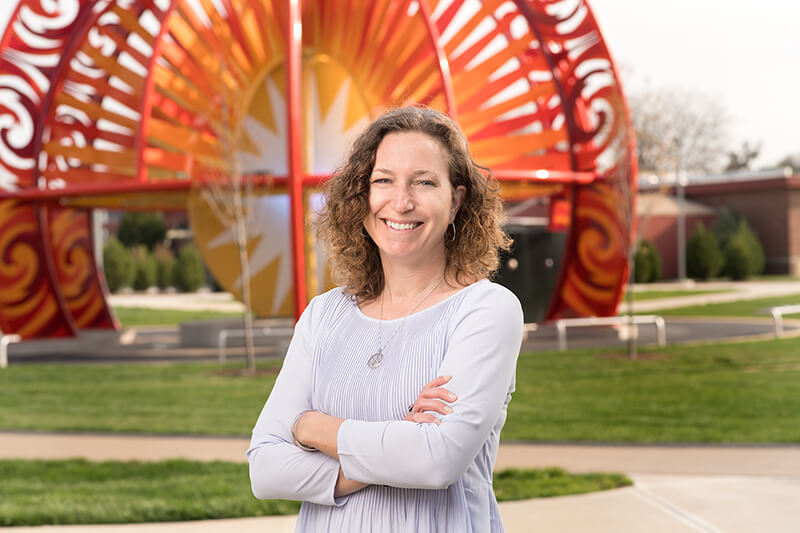April 19, 2017
Exceptional Early Career Award: Stephanie Gardner
 Stephanie Gardner, assistant professor of biological sciences. (Purdue University photo/John Underwood)
Download image
Stephanie Gardner, assistant professor of biological sciences. (Purdue University photo/John Underwood)
Download image
In recognition of outstanding undergraduate teaching, two professors recently received the 2017 Exceptional Early Career Award. This Q&A focuses on award recipient Stephanie Gardner, assistant professor of biological sciences.
Years at Purdue: 10
Teaching interests: I teach lecture and laboratory courses in physiology and neurobiology.
Goals as a professor: My overall goal as a professor is to create a learning partnership with my students; it takes work from both members of the partnership. I try to create meaningful learning opportunities with clear expectations for my students to master difficult concepts and skills. These opportunities include designing experiments and presenting results in the lab, sleuthing out answers to case studies in lecture, and exploring topics that interest them to present to their classmates. I aim to be not merely a source of information for my students, but a facilitator and motivator for their learning.
Lessons students have taught you: The best lesson that my students have taught me is that they are excited to learn, take ownership, and work hard. Finding spaces in my courses to give them opportunities to take control and be creative has been a result of this lesson and has enhanced the experience and learning for everyone.
What inspired Gardner to teach: I have been interested in teaching and education for as long as I can remember, starting back in elementary school. I was inspired by many of my teachers, teaching assistants, and professors during my own education. When I had the opportunity to serve as an undergraduate teaching assistant in an introductory biology lab and was able to help a first-year biology major have a "light bulb moment," I knew where I wanted to spend my time! I went to a small, liberal arts college where close relationships with faculty occur very naturally and I draw on that experience for my own teaching and cultivate relationships with my students starting by knowing their names. Getting to know my students and sharing with them something that I love (science!) is a wonderful opportunity.
Favorite teaching moment: My favorite teaching moments are those when I can sit back and observe my students at the end of the semester showcasing their knowledge and skill. I am so proud of my first-year students when they are presenting their results to other professors in our public research poster session. I am pleased when I see the enthusiasm of my upper-division physiology students during our project fair on the last day of class. Enabling and empowering my students is very satisfying.
On the impact of engaging students in research opportunities: I strongly believe that learning science should include doing science. Students in all of my classes have the opportunity to ask questions, design and conduct experiments, analyze their results, and communicate their findings. This allows students not only to understand scientific concepts, but also to understand the ways in which scientists gather evidence and make new discoveries. Allowing students to engage in novel research within their courses is an incredible opportunity which has been shown to increase their interest, engagement, and identity with science. Seeing the real-world application of concepts and techniques in lab classes provides a meaningful context in which to learn.
On the decision to use CATME and how it has improved student learning and teamwork: In all of my classes, students work in teams within the laboratory and their ability to work together effectively is important to me and for their learning. However, working with other people is hard! I have heard from many students over the years that they are frustrated with the fact that they are asked to work in groups in their courses, but aren’t given guidance on how to do so effectively nor have team dynamics and effectiveness been monitored by instructors. CATME is a team formation and management tool that is grounded in evidence from teaming research. It allows me to quickly get the students sorted into diverse teams based on their responses to an online survey that includes self-report on their learning perspectives and team role preferences. CATME also has a peer and self-evaluation feature (CATME-Bars) that I use three times during the semester to monitor the student groups. Students respond to an online survey in which they rate themselves and their teammates on a variety of teaming effectiveness questions. This allows me to monitor the teams to spot potential issues to address with teams, and the students receive anonymous feedback based on the results of the survey; they see where they rated themselves and the average of where their teammates rated them on the teaming questions. This has been great for me as an instructor in helping the students work together and reinforces accountability to the team for the students.
Thoughts on being nominated and selected to receive this award: This award is such an incredible honor and motivates me to work even harder to feel like I deserve it each and every day. I am privileged to have the opportunity to work with undergraduates here at Purdue both in the classroom and in my research lab. I know that many of my former students were asked to provide their perspectives on me and my teaching as part of the award nomination and I am so pleased that they felt I was worthy of this award.
What her students say: I love your enthusiasm. It made me want to excel and learn as much as possible. … Excellent class and excellent professor that put a LOT of time and effort into the course. … I love this class because my professor is passionate about the subject matter. … Dr. Gardner, you are an AMAZING professor.
Writer: Cat Dillon, 317-869-5566, dillon16@purdue.edu

